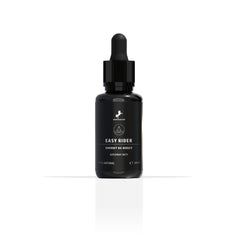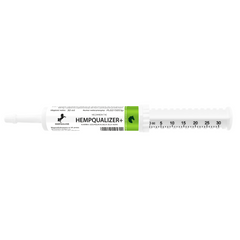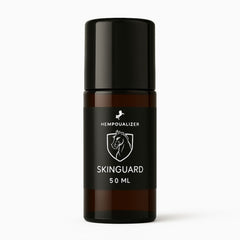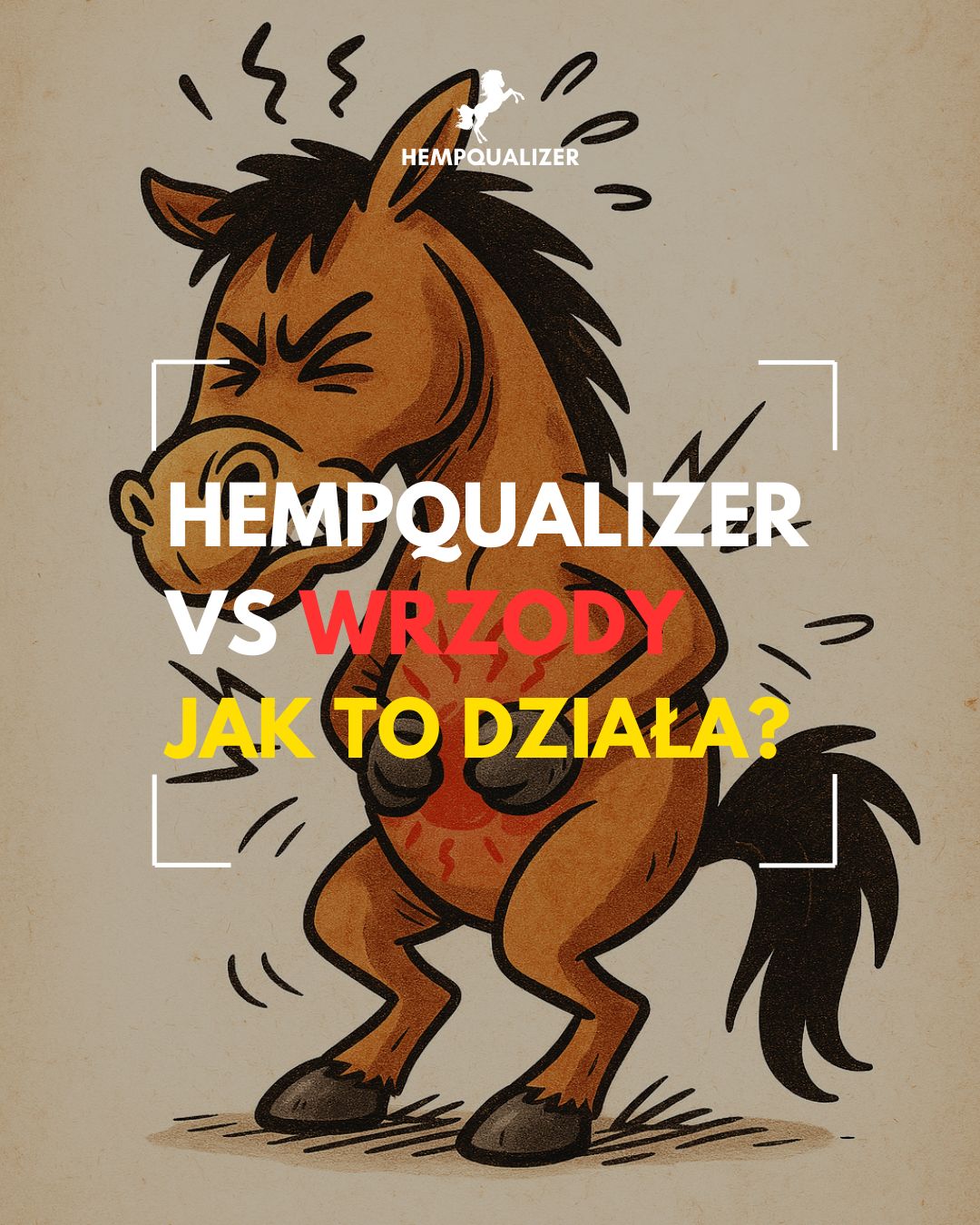Below you’ll find a detailed explanation of why the combination of CBD + CBG + CO₂ extract from lemon balm (Hempqualizer+) may support horses with gastric ulcers (EGUS: squamous/ESGD and glandular/EGGD), supported by literature data (various species, experimental models, human clinical trials), field observations, and results from our client horses. This is not a replacement for standard therapies (e.g., omeprazole), but it helps to understand the potential value of this product as part of a broader management and support strategy for horses at risk of or suffering from ulcers.
1. A quick refresher on the pathophysiology of equine ulcers: acid + no forage + stress + effort + NSAIDs
Horses secrete stomach acid continuously; long periods without forage, high-starch feeds, intense training (acid “splashes” onto the unprotected squamous lining), transport/stable stress, and NSAID use significantly increase the risk of ulcer formation. Good management (constant access to forage, reduced stress, frequent feeding) is essential for both prevention and supportive care.
2. Stress and the HPA axis are especially linked to glandular ulcers (EGGD)
Research shows that horses with EGGD have an exaggerated cortisol response after ACTH stimulation (a sign of hypersensitive hypothalamic–pituitary–adrenal axis). Stressful events (competitions, transport, environmental changes) are correlated with the frequency and severity of glandular lesions. Minimizing stress is a recommended part of treatment and prevention.
3. Cannabinoids may reduce acid secretion and protect the gastric mucosa
Scientific reviews of the endocannabinoid system in the GI tract describe how activation of CB₁ receptors by cannabinoids (including plant-derived) can reduce acid secretion, lower motility, and prevent stress-, NSAID-, and alcohol-induced mucosal damage in animal models. These are mostly preclinical data, but they suggest a potential cytoprotective mechanism.
4. Anti-inflammatory and neuro-immunological modulation by CBD
CBD shows strong anti-inflammatory effects in models of intestinal inflammation (in mice and human tissues), including inhibition of reactive enteric glial cell activation, reduction of TNF‑α, iNOS, and other inflammatory mediators (partly via PPAR‑γ). CBD may also normalize motility under inflammatory conditions. These properties are particularly relevant, as EGGD often includes an inflammatory mucosal component.
5. CBG (and full-spectrum extracts containing CBD+CBG) reduce intestinal inflammation and modulate the microbiome (IBD models)
In a DSS-induced colitis model in mice, a CBG-rich hemp extract (with CBD and CBC) significantly reduced disease index, shortened inflammation duration, limited histological damage, and shifted gut microbiota and metabolome profiles toward an anti-inflammatory state. CBG has also shown anti-inflammatory effects in DNBS-induced colitis models. Although these are intestinal rather than gastric models, these mechanisms may support gastric mucosal healing.
6. Lemon balm (Melissa officinalis): gastroprotection, antioxidant effects, PGE₂ modulation, calming properties
Melissa extracts reduced ulcer index in stress- and indomethacin-induced ulcer models in rats, accompanied by reduced lipid peroxidation markers (MDA) and increased antioxidant enzymes (SOD, GPx). The key compound, rosmarinic acid, protected in ethanol-induced gastritis models by boosting PGE₂ and reinforcing the mucosal barrier. Clinical reviews highlight lemon balm’s rich polyphenol content (especially rosmarinic acid) and suggest calming effects via GABAergic modulation – relevant for EGGD.
7. Calmer horses = more chewing, better feed intake, and better acid buffering
Field data and early observational studies on CBD in horses suggest improvements in behavior, trainability, and sometimes appetite (note: small samples, need for RCTs). If a horse eats more frequently and calmly, salivation increases and a fiber mat forms in the stomach, which physically and chemically buffers acid – a critical mechanism in ESGD prevention.
8. What do we know?
-
Environmental stress and feeding patterns play a major role in EGUS; forage and stress management are key.
-
Cannabinoids show gastroprotective, anti-inflammatory, and antisecretory effects in animal models.
-
CBG + CBD reduce gut inflammation and modulate microbiota in IBD models.
-
Lemon balm (especially rosmarinic acid) has antioxidant, cytoprotective, and calming effects.
9. When to consider Hempqualizer+ as ulcer support
Use cases:
-
Horses with recurring EGGD where environmental stress is difficult to avoid (shows, travel). Note: Hempqualizer and Hempqualizer+ contain cannabinoids considered doping substances. For sport horses, we recommend Hempqualizer Compete (doping-free), which has a high concentration of our unique CO₂ lemon balm extract – also useful in horses prone to ulcers.
-
Horses finishing omeprazole treatment – as maintenance support to reduce stress-related relapse.
-
Nervous or picky eaters where calming and appetite stimulation might increase chewing time and acid buffering.
Practical guidelines (draft concept, needs validation):
-
Base management: free access to quality hay or slow-feed nets; reduce starch; avoid long feed gaps.
-
Monitor stress: identify high-stress periods (shows, transport); consider starting supplement 5–7 days before and after.
-
Track feed intake and behavior (appetite, time at hay, tacking up); improved feeding = real ulcer protection.
References (thematic):
-
EGUS pathophysiology, risk & management: UCDavis EGUS; AAEP Reduce Ulcer Risk; Norbrook Horse Owner’s Guide; Animals 2023
-
Stress / Cortisol / EGGD: J Anim Sci 2018; Vet J 2017; VMRR 2019 PubMed PubMed DoveMedicalPress
-
Cannabinoids – GI protection: MDPI, PMC – Cannabinoids & GI Health PMC mdpi.com
-
CBD – gut inflammation & neuroimmunology: PLOS One PLOS
-
CBG – colitis, microbiome: JPET 2024 PMC
-
CBD in horses – early behavior observations: Tarleton State University Equine CBD reports americanfarriers.com IVC Journal






